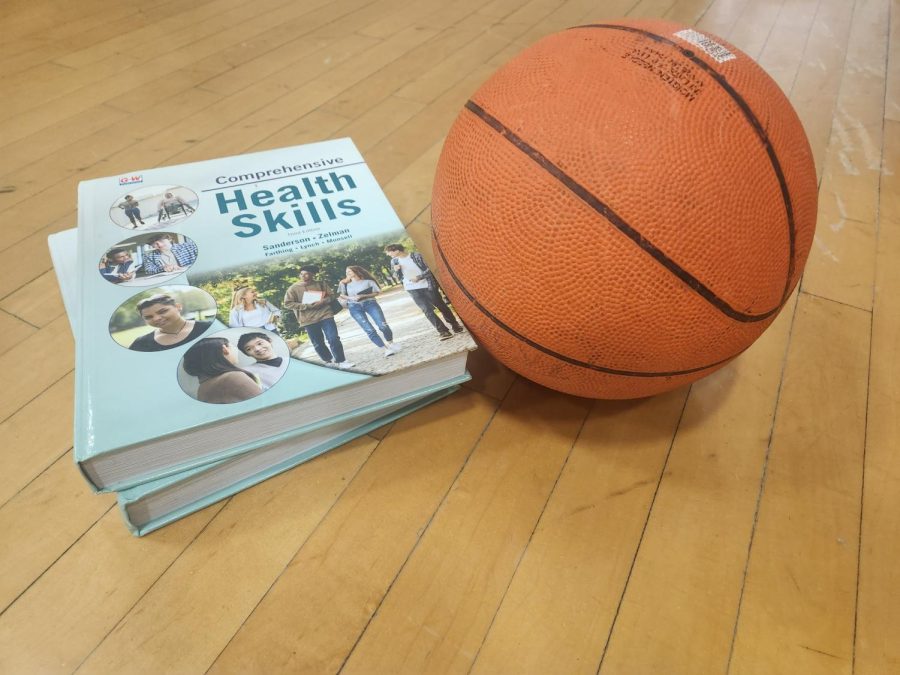Student-Athlete or Athletic Student?
The inside scoop on the sports eligibility policy and what could improve it.
Every school has a policy that has to be followed by student-athletes that makes them eligible to play their sport. The Michigan High School Athletic Association policy states a student has to be passing 66 percent of their course load (which usually equates to four out of six classes) in order to participate in competition. According to Shane Hynes, Troy High School Athletic Coordinator, the Troy School District holds their student-athletes to higher standards, and they are required to be passing five out of six classes in order to participate in competition. Hynes also explained that the policy is enforced by grade checks throughout the semester that determine whether student-athletes are eligible to play. Hynes explains that the Athletic Association requires schools to check grades for all student-athletes at least once every ten weeks. If the student meets the requirements they are eligible to play, and if they don’t, then they are ineligible for the next 60 school days.
The issue many find with this policy is that the way it is written causes academic eligibility checks to disproportionately impact certain athletes based on the season they compete in. Due to the arrangement of Troy High School’s academic calendar and sports seasons, athletes do not receive the same number of grade checks in the fall, winter, and spring sports seasons. For example, grades typically impact athletes most during the winter sports season, because the fall season is done before the conclusion of the first semester and the spring season happens after. Many students have an opinion on the issue.
Senior swimmer Erin Xia explained, “That definitely gives a disadvantage to winter sports.”
Senior volleyball player Alvina Zaitona described the situation as “interesting” because she didn’t know this was happening. This was the case with most students surveyed: not very many people know what the specific policy is, so when grade checks were based on student scores in the previous semester they were mostly surprised.
After hearing this information, many students voiced their opinions about what could happen to make the policy more effective. Zaitona said, “For them to just check it more often and maybe have coaches more involved because I feel like coaches do care a lot about the well-being of their players.”
Freshman football player Jack Sobotka says he thinks it should be “enforced at the end of each card marking or quarter.”
Some teachers shared different opinions on the topic. Kyle Larson, the head boys varsity swim coach, says, “Honestly, providing the coaches with access to student progress [would be helpful], but the problem with that is it’s a pretty big FERPA violation which is academic privacy for students. However, that would give coaches the ability to check the progress daily and you’d be able to determine right away if it looks like someone is starting to not just fail but fall behind.” FERPA being the Family Educational Rights and Privacy Act, which is a federal law that, as Larson said, protects students’ academic records.
Jessica Craft, a social studies teacher, shared Larson’s opinion: “[Grade] checks should happen either once every two weeks or once a month even. And whether that’s a piece of paper that they go around and get the teachers to sign or coaches have access to their grades, something like that so you can see before it’s too late.”
Along with this, Craft also said she thinks “student-athletes should be passing all six of their classes to be eligible,” which is another common opinion shared between not just teachers but coaches as well.
Lisa Danhoff, a health and physical education teacher and the junior varsity golf coach, shared her thoughts, “I was a coach in the building, and being a student-athlete, to me student comes first, so when I was coaching, my players had to be passing all six classes and I was even tougher on them. They couldn’t have any C’s, otherwise, they didn’t play. They could come to practice, they could be on the team, but they wouldn’t play.” Danhoff is not the only one to point out that the term is student-athlete, with “student” coming first. That’s done on purpose, student being the more important out of the two. She’s not the only one that thinks so.
Hynes later said, “I think when you talk about Troy Schools, we do hold ourselves to a higher standard and it’s my expectation that our student-athletes shouldn’t be failing any classes.”
He continued on to say, “At the end of the day, you’re a student first and an athlete second, so if we’re not taking care of business in the classroom, you have no business being out playing your sport.”
Although this may seem like a high standard for high school students, it’s been shown that the expectation exists because teachers and coaches care about their students and players. Danhoff explained, “That was something I instilled because with most kids the academics, what we learn, is going to get us further in life than playing the sport.”
Chris Frasier, history teacher, and head varsity football coach had the same idea saying, “I think it should be a policy and I think it should be enforced because you know it’s called student-athletes and most of them aren’t going to go play in college, so they need to focus on their grades first before their athletics.”
Even some students share this opinion, “Academics over sports 100 percent, you could get scholarships for colleges for academics a lot easier than sports so I would say academics is a lot more important than sports are,” Sobotka said when asked how committed to his academics he was.
While Troy High School does have an academic eligibility policy for their athletes to follow, many agree that there are potential avenues to further strengthen it, whether that’s more frequent grade checks or additional enforcement.
Your donation will support the student journalists of Troy High School - MI. Your contribution will allow us to print our work, purchase equipment and cover our annual website hosting costs.



